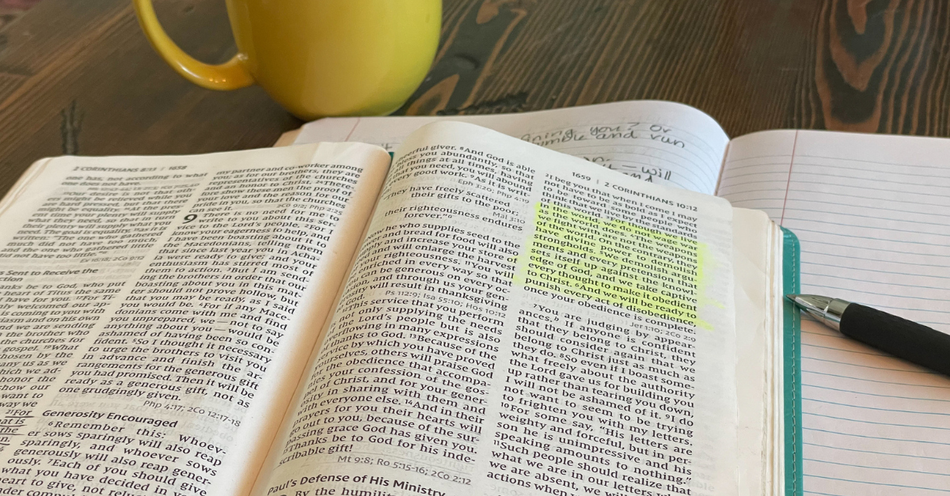Throughout the Bible, thankfulness is seen as people's natural response to experiencing God's goodness and mercy. From Hannah's Song of Thanksgiving (1 Samuel 2:1-10) to David's many Psalms (Psalms 18) to the radical change in redeemed sinners like Zacchaeus (Luke 19:1-10) and the apostle Paul (Acts 9:1-31), a heart transformed by God’s love will overflow with gratitude and thanksgiving. At least, it should.
While God is certainly worthy of honor and praise, the Bible demonstrates that not everyone returns to render unto God what is His or gives God due credit. From the Israelites’ short-lived thankfulness when they forgot God’s miracles and covenant (Hosea 4:6; Deuteronomy 4:9; Numbers 14:11) to the nine lepers healed by Jesus who didn’t return to thank Him (Luke 17:11-19), the Bible reminds us that, despite God's undeserved grace, humans can still be selfish, forgetful and ungrateful.
Furthermore, for the believer, gratitude is our testimony of God's goodness to the world. Unfortunately, nothing sours the world's relationship with the church and even Christ quite like miserable, unpleasant, and, yes, ungrateful Christians.
For this reason, the Bible encourages and even commands Christians of all generations to remember God's goodness and faithfulness and be grateful at all times. According to the Bible, we are called to "rejoice always, pray without ceasing, in everything give thanks for this is the will of God in Christ Jesus for you" (1 Thessalonians 5:18), to "give thanks to the LORD, for He is good. His love endures forever." (Psalms 136:1), and to "enter his gates with thanksgiving and his courts with praise; give thanks to him and praise his name. For the LORD is good and his love endures forever; his faithfulness continues through all generations."(Psalms 100:4)
But how do we cultivate a grateful heart in a world that is ever more entitled, selfish, and ungrateful daily?
Here are three especially inspiring stories of thankfulness from the Bible worth studying.
1. Israel Prepares an Extravagant Offering of Thanksgiving (Numbers 31:48-52)
With slavery’s chains and Egypt’s monuments behind them, the Israelites looked forward to entering the land God had promised them and their ancestors. However, to get there, they had to contend with numerous hostile nations that wanted nothing to do with God's covenant people.
Thankfully, God was with His people and faithful to deliver them from their enemies. However, the Israelites often forgot God's promises and lost sight of God's power. As a result, they suffered casualties and setbacks along the way.
And yet, following a battle between the Israelites and the Midianites, the army officers brought back an unusual report. Although Israel had won the battle, Moses awaited the grim tally of Israel's losses. However, when the commanders came before Moses, they said, "y.our servants have taken a census of men of war who are in our charge, and no man of us is missing" (Numbers 31:49).
Miraculously, not one of the 12,000 Israelites sent into battle was slain or missing in action. Israel had suffered not a single casualty! Not one!
No wives would become widows. No children would grow up fatherless in the battle’s aftermath. No mothers would receive news that their sons weren't coming home. No funerals. No dirges. No mourning. Against the Midianites, they had done more than just win. They had won without losing a single life. That would be a miracle in any century.
There was no denying that God had delivered His people in battle.
And how did Israel respond?
The Israelites came together, bringing "articles of gold, armlets and bracelets, signet rings, earrings, and necklaces" as an offering to the Lord (Numbers 31:50). When everything was assembled, the weight of the gold gathered from their offerings was 16,750 shekels, a number that far exceeded what had been established or even required as the standard offering following a great victory.
How many times had Israel failed God, broken the covenant, or failed to give credit where credit was due? Nevertheless, God was still faithful to His people.
In gratitude, the people gave an extravagant offering to overflow their grateful hearts. It was a response to the extravagant, undeserved grace God had shown. Furthermore, in their offering, the Israelites heeded God's warning to be grateful, thanking Him with all they had and then some for His abundance and mercy(Deuteronomy 28:45-47).
2. The Returning Exiles Commit to Worshipping God (Ezra 3:8-13)
Israel’s Old Testament history is a fascinating case study in faithfulness, failure, and forgetfulness. Despite God's overwhelming goodness, the people frequently forgot His miracles, abandoned His word, and committed sin and idolatry—sometimes even rivaling their pagan neighbors’ behavior.
To break Israel of idolatry, God used foreign nations to chastise His people. Assyria took the northern kingdom into exile. First, their people scattered and intermarried, becoming the Samaritans. Later, Babylon took the remaining Israelite kingdom (the southern kingdom of Judah) captive. God’s people lived in exile for over 70 years. Nevertheless, God upheld a remnant of His people. In His mercy, He also promised to bring His people back to Jerusalem and restore their home city.
Under the leadership of Zerubbabel, Ezra, and Nehemiah, Judah’s exiles (now called the Jews) returned to Israel and labored to rebuild the temple, the holy city, and its walls.
The scribe Ezra writes that "when the builders had laid the foundation of the temple of the Lord, the priests stood in their apparel with trumpets, and the Levites, the sons of Asaph, with cymbals, to praise the Lord according to the directions of King David of Israel. And they sang, praising and giving thanks to the Lord, saying, 'for He is good, for His favor is upon Israel forever.' And all the people shouted with a great shout of joy when they praised the Lord, because the foundation of the house of the Lord was laid." (Ezra 3:10-11)
In God's love for Israel, He used Babylon to break their greatest sin and return their hearts to Him. God sustained a remnant even when His people were exiled. In His sovereign power over the nations, He moved in foreign kings’ hearts to open doors for His people to return to their ancestral home. And in His mercy, He restored to Israel what had been lost, empowering a generation to rebuild their city, home, and lives.
God had proven Himself faithful when Israel was not and good even when they had not been. Furthermore, His promises to His covenant people have been proven irrefutably true.
Once home, the nation recalled the prophet Jeremiah’s words about God’s promises: "For I know the plans that I have for you,' declares the Lord, 'plans for prosperity and not for disaster, to give you a future and a hope. Then you will call upon Me and come and pray to Me, and I will listen to you. And you will seek Me and find Me when you search for Me with all your heart. I will let Myself be found by you,' declares the Lord, 'and I will restore your fortunes and gather you from all the nations and all the places where I have driven you,' declares the Lord, 'and I will bring you back to the place from where I sent you into exile.'" (Jeremiah 29:11-14)
Having encountered God's generational goodness and mercy, the people showed gratitude through worship and praise. As a nation, they finally gave God the glory He was due (Psalms 29:1-2).
3. The Woman Anoints Jesus' Feet (Luke 7:37-50)
Undoubtedly, when God’s love changes people’s lives, their expressions of gratitude are great yet always pale compared to His actual goodness.
In one story, a nation collected an extravagant offering to thank the Lord for His miracle. And yet, Jesus would remind His listeners that God ultimately looks at the heart, not our giving size (Luke 21:1-3). Furthermore, no matter how lavish, our offerings cannot buy salvation, God's love, or His favor. They are merely a grateful heart’s overflow.
In another story, a grateful people sang worship songs, praising God for His goodness and faithfulness. All who have seen God's work should naturally respond this way. However, our worship's quality is not measured by the stage's size, the musicians' talent, or the performers' volume. Sometimes, the quiet songs of praise sung in private render under God what is His.
God performed clear miracles in both Old Testament stories, affecting an entire nation. An army was delivered in battle. A people was allowed to return from exile to rebuild their home.
But what does gratitude look like when God's love transforms the individual's heart? The gospel gives us a powerful example.
Luke's gospel describes a woman who had come to see Jesus one night while He was eating at a Pharisee's house. According to Luke, this woman was a notorious sinner. However, in Jesus' presence, she "brought an alabaster vial of perfume, and standing behind Him at His feet, weeping, she began to wet His feet with her tears, and kept wiping them with the hair of her head, and kissing His feet and anointing them with her perfume." (Luke 7:36-38)
Those watching were shocked at the woman's boldness. Furthermore, many questioned how Jesus could allow such a woman even to touch him. If only He knew who she was, He would have certainly and swiftly thrown her out.
Jesus had no such reaction.
Rather, He told his listeners a powerful parable, reminding them that someone forgiven of much will ultimately be more grateful than the one forgiven little (Luke 7:40-50).
This woman came to Jesus in tears, recognizing her need for a savior. She wept at His feet, anointing Him with perfume because she believed in what He alone could do for her. Unlike those convinced they have it all together, this woman was unafraid to risk humiliation and further ostracization to sit with Jesus. She used what she had and gave all she had because all that did not compare to the one thing she desperately needed: forgiveness.
Jesus then said, "for this reason I say to you, her sins, which are many, have been forgiven, for she loved much; but he who is forgiven little loves little... your sins have been forgiven" (Luke 7:47-48).
This woman was eternally grateful for salvation and forgiveness, as seen in her desire to sit at Jesus' feet. Forgiven of much, all she wanted to do was be with her deliverer and forgiver. In her case, no words could describe the gratitude she felt. Only a beautiful and tender act of love would suffice.
Of course, a heart transformed by God's love can express gratitude in many ways. In these three stories, the thankful heart overflows thankfulness by craving a chance to give, worship, sit, and serve.
May we all have a heart that overflows with gratitude and learn to cultivate genuine thankfulness as we look to Jesus Christ's goodness and grace. Amen.
Photo Credit: ©Getty Images/ Dennis Swanson - Studio 101 West Photography

This article is part of our Bible resource for understanding the significance and meaning of biblical phrases and ideas. Here are our most popular Bible articles to grow in your knowledge of God's Word:
Promises of God in the Bible
Is "This Too Shall Pass" in the Bible?
What Was the Ark of the Covenant?
Top 10 Bible Stories for Kids
“Iron Sharpens Iron” in Proverbs 27:17
"Fearfully and Wonderfully Made" in Psalm 139
“Be Still and Know That I am God” in Psalm 46:10
"No Weapon Formed Against Me Shall Prosper" - Isaiah 54:17


.jpg)
.jpg)
